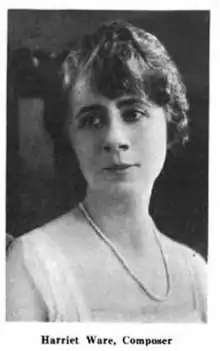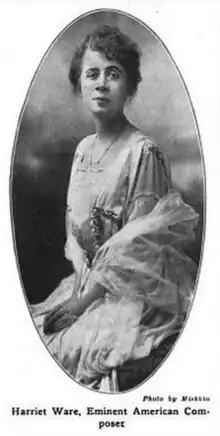

Harriet Ware (August 26, 1877 – February 9, 1962) was an American composer, pianist, and music educator.
Early life
Harriet Ware was born in Waupun, Wisconsin, the daughter of Silas Edward Ware and Emily Sperry Ware. She showed musical promise from an early age,[1] and graduated from Pillsbury Conservatory of Music in 1895, with further studies in Paris and Berlin.[2]
Career
Harriet Ware composed songs, choral works, piano pieces, and at least one opera, Undine.[3] Her "Hindu Slumber Song" (1909) and Call of Râdha (1909) were settings of poems by Sarojini Naidu. She also wrote settings of poems by Thomas Moore, Edwin Markham, Cale Young Rice, Elizabeth Barrett Browning, Richard Lovelace, Bayard Taylor, Joyce Kilmer,[4] and Marie Van Vorst. She also wrote musical plays, The Morning Glory and The Varying Shore, both with Zoë Akins.[5]
Her "Women's Triumphal March" was the official song of the General Federation of Women's Clubs in 1929, and her setting of Daniel A. Poling's poem "The Rose is Red" was the song of the American Mothers Association.[1][6] Harriet Ware's works were especially popular in programs of American song, or in programs focused on women composers.[7][8]
Harriet Ware saw the importance of women's clubs in supporting the arts, saying "Musicians do well to pin their faith to these aggregations of 'the people' rather than to the wealth or social influence of a few."[9] She was a founder and leader of the Musical Art Society of Long Island.[10] During World War I the society gave a concert of Ware's music, to benefit local wives and children of soldiers.[11] She also served on the advisory council of the New York Music School Settlement.[12] She was also active with the Musical Alliance of the United States, and served on a jury for the organization's national Girl Scout songwriting competition in 1918, along with composers Amy Beach, Gena Branscombe, Fay Foster and Margaret Ruthven Lang.[13]
As a pianist, she toured in the American South in 1920.[14] In 1937 she was touring the western United States,[15] giving classes, interviews, and lectures, as well as performances. She heard one of her works conducted at the Hollywood Bowl by Hidemaro Konoye.[16] For several years she ran a summer music school in Plainfield, New Jersey.[17]
From 1926, she ran her own music publishing house, and was a member of the American Society of Composers, Authors and Publishers (ASCAP).[1]
Personal life
Harriet Ware married a chemical engineer, Hugh Montgomery Krumbhaar, in 1913; the bridal air she wrote for the cantata Sir Oluf was played at their wedding ceremony, and David Bispham sang her song "How Do I Love Thee?".[18][19] She was widowed in 1950 and died in New York City in 1962, aged 84 years.[1][20]
References
- 1 2 3 4 "Harriet Ware, Musician, Noted Pianist, Composer" Courier-News (February 10, 1962): 20. via Newspapers.com

- ↑ John William Leonard, ed., Woman's Who's Who of America (American Commonwealth Company 1914): 854.
- ↑ The Musical Blue Book of America (Musical Blue Book Corporation 1922): 238.
- ↑ "Imprisoning the Fragrance of the Fields in the Lyric Language" Musical America (April 23, 1921): 35.
- ↑ Zoë Akins Papers: Finding Aid, Huntington Library, Manuscripts Department.
- ↑ Christine Ammer, Unsung: A History of Women in American Music (2016). ISBN 9781483577005
- ↑ "Feminist Note in Rubinstein Concert" Musical America (March 3, 1917): 28.
- ↑ "Scenes at Harriet Ware's Summer School" Musical Courier (October 2, 1919): 37.
- ↑ "American Slight American Songs, Says Harriet Ware" Musical America (April 28, 1917): 29.
- ↑ "Club Which She Founded Entertains for Harriet Ware" Musical America (January 1, 1921): 44.
- ↑ "Ware Concert Aids Soldiers' Families" Musical America (June 26, 1917): 27.
- ↑ Anne Prince, "The Music School Settlement and Activities" Musical Monitor (May 1920): 340.
- ↑ "Mabel Daniels Winner of Girl Scouts Song Contest" Musical America (September 21, 1918): 19.
- ↑ "Tributes for Ware as Composer-Pianist" Musical Courier (April 22, 1920): 56.
- ↑ "On Concert Tour Through West" Courier-News (May 15, 1937): 9. via Newspapers.com

- ↑ "Harriet Ware Returns Musical Triumph" Courier-News (October 16, 1937): 5. via Newspapers.com

- ↑ "Widespread Interest in Harriet Ware's Summer School" Musical America (June 22, 1918): 6.
- ↑ "Composer Weds, Her Music Played" New York Times (December 9, 1913): 11. via ProQuest
- ↑ John William Leonard, Albert Nelson Marquis, Who's who in America (A. N. Marquis 1920): 2969.
- ↑ "Harriet Ware, Concert Pianist and Composer, is Dead at 84" New York Times (February 11, 1962): 86. via ProQuest
External links
- Harriet Ware's gravesite, on Find a Grave.
- Harriet Ware compositions at IMSLP, Petrucci Music Library.